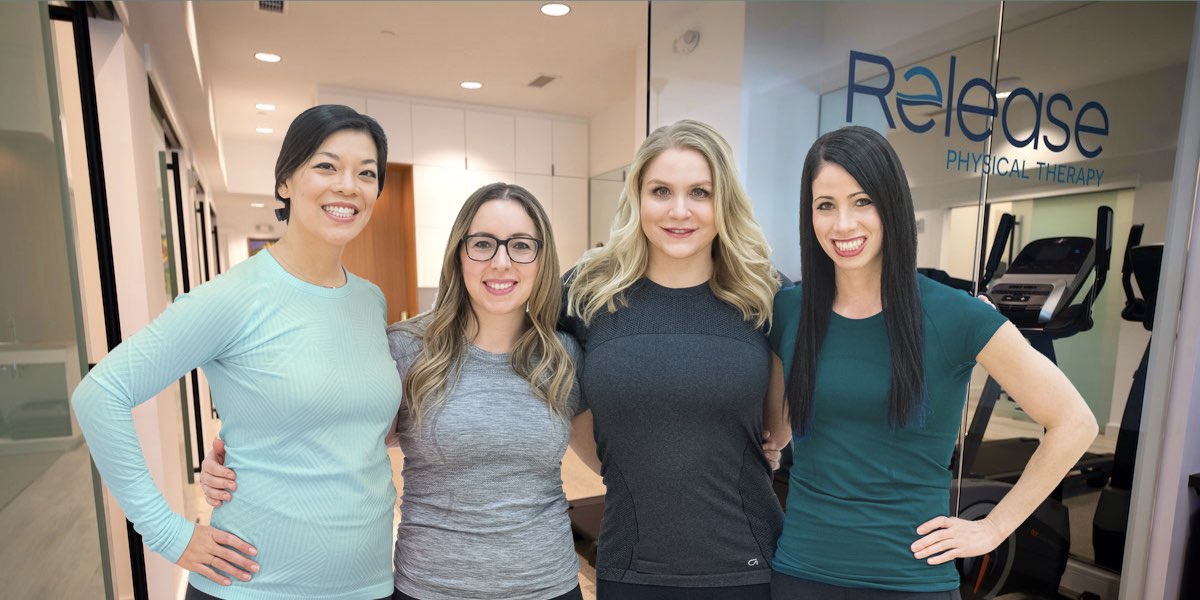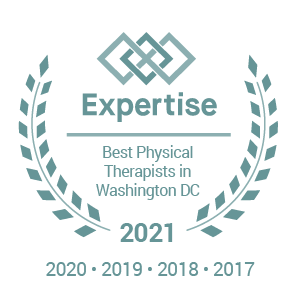
TMJ Physical Therapy in Washington, D.C.
At Release Physical Therapy, our experienced therapists perform comprehensive assessments to see how they can help with your TMJ pain. We then design individualized treatment plans aimed at promoting healing and relieving your specific issues.
TMJ Physical Therapy in Washington, D.C.
At Release Physical Therapy, our experienced therapists perform comprehensive assessments to see how they can help with your TMJ pain. We then design individualized treatment plans aimed at promoting healing and relieving your specific issues.
Book an appointment online with your preferred therapist at one of our convenient locations.
Release PTs have advanced training and experience in several techniques - including listening.
We use evidence-based therapies to target the root cause of a condition, not just the symptoms.
We'll help you get back to work, back in the game, and back to doing the activities you love.
Treatment for TMJ Dysfunction
What is TMJ dysfunction?
TMJ dysfunction or TMD is a disorder of the temporomandibular joint or joint around your jaw. There are two joints on either side of your mouth, and each joint is a hinge joint that helps with the function of the mouth. TMJ dysfunction can involve the joints, bones, or nerves around the jaw and face.
What are signs that you have a TMJ disorder?
Some signs and symptoms you may experience if you have a disorder of your temporomandibular joint include pain in the jaw, popping or clicking around the jaw, pain with chewing or talking, difficulty opening/closing the mouth, headaches, dizziness, aches in or around the ear, or locking around the jaw. You may also notice a change in the way your top and bottom teeth come together. If you are experiencing any of these symptoms, reach out to a physical therapist at Release Physical Therapy to schedule an evaluation today.
What causes TMJ dysfunction?
There are many factors that contribute to TMJ dysfunction. These can include excessive strain or stress to the temporomandibular joint. This excessive strain can be a result of habitual grinding or clenching of the teeth. TMJ dysfunction can also be caused by arthritis or trauma to the jaw. Additional factors that should be evaluated when addressing TMJ dysfunction are the musculature around the face and neck, posture, and lifestyle factors including sleep positions, work postures, and stress management.
What’s the most successful treatment for TMJ?
Physical therapy, medication, and mouthguards are the best ways to treat TMJ disorders with conservative management. At your physical therapy evaluation, your expert Release physical therapist will do a thorough assessment and help to address your posture, muscle tone, and lifestyle habits and help make changes that can help with your symptom management. These can be recommendations in diet changes to reduce pain with eating, postural adjustments to reduce strain on the head/jaw/neck, relaxation techniques and ways to address stress management, and tips to help reduce grinding and strain and prevent the need for surgical intervention. Call Release Physical Therapy today to schedule your evaluation if you think you would benefit from physical therapy for TMJ dysfunction.
Now Accepting New Patients
Feel Your Very Best
Whether you’re an athlete that plays hard on the field, or a weekend warrior that plays hard in life, committing to a physical therapy program can help to keep you moving forward.
What happens during the initial assessment for TMJ physical therapy?
During the initial evaluation for the TMJ, similar to any other body part, your physical therapist at Release Physical Therapy will do a full evaluation. An evaluation includes a series of questions about you and your goals related to your TMJ dysfunction and medical history. From there, your therapist will do an assessment of your posture, how your jaw and neck move, your muscle and joint flexibility/mobility, and your strength. They will gather information to create a plan of care specifically designed for you and your goals. Usually, your therapist can get right to treatment on the very first day. They will take the information from your assessment and educate you on how your treatment sessions will look, including what to expect, frequency, duration, etc. Reach out to Release Physical Therapy today to get started if you are having TMJ pain.
What kind of treatments are generally done to help TMJ dysfunction?
Physical therapy, in conjunction with medication and mouthguards are the best way to treat TMJ dysfunction. Physical therapy treatment may include manual therapy including deep tissue mobilization, joint mobilization, dry needling, and stretching. It may also include other modalities such as laser therapy or shockwave therapy. Additionally, your therapist will provide you with a home exercise program that will help with self-management techniques and may include stretching, self-massage/mobilization, and strengthening/postural re-education.
What should I avoid while going through physical therapy for TMJ issues?
At your initial evaluation for your TMJ dysfunction, your therapist can help discuss what activities should be avoided while you are dealing with jaw pain. Sometimes your therapist will guide you to avoid certain foods that may aggravate your jaw, such as hard bread/bagels or chewing gum. They may also advise you to perform stress management techniques to avoid stress which can further impact jaw clenching, teeth grinding, and poor posture. If you have any questions about what you should and should not be doing, reach out to Release Physical Therapy today to schedule an evaluation and get an individualized answer just for you.
What are some good exercises to do to help aid in the healing of TMJ disorders?
There are many exercises that can help with treating TMJ dysfunction. Not every person will have the same set of answers depending on what is found in their initial evaluation. Some patients may benefit from jaw-strengthening exercises, while others may benefit from exercises that will target their neck or back and posture. Schedule your evaluation with Release Physical Therapy today and find out what exercises are best for you to do to mitigate your jaw/TMJ pain.
What’s the average time it takes for TMJ dysfunction to heal when using physical therapy?
The answer is anywhere from several weeks to several months. The length of time required to treat TMJ dysfunction depends on the nature of the injury and the function of the jaw. A patient’s overall health will also impact their prognosis.
At Release Physical Therapy, we provide intensive 55-minute sessions designed to optimize recovery time without compromising on the quality of care. These sessions allow ample time for different therapeutic techniques best suited for the patient’s condition and are always tailored to the individual’s unique needs and circumstances. Commitment outside of the therapy session also plays a large role in recovery. Following the prescribed at-home exercises and care can significantly accelerate healing and improve long-term outcomes.
We'll help you get back to work, back in the game, and back to doing the activities you love.
Release Physical Therapy
Treatments
At Release Physical Therapy Washington, DC, we offer a full range of manual therapies, as well as both traditional and non-traditional techniques. We work one-on-one with our patients to develop an individualized treatment plan that meets their unique needs, conditions, wellness goals and fitness levels. Learn More
ASTYM ® Therapy
Regenerates healthy soft tissues (muscles, tendons, etc.), and eliminates or reduces unwanted scar tissue that may be causing pain or movement restrictions.
Functional Training
Exercise regimens that integrate multiple muscle groups, joints and the brain to prepare the body for everyday movement, athletics and other specialized physical activities.
Shockwave Therapy
A non-invasive, office based treatment that utilizes acoustic waves to alleviate pain, promote tissue regeneration, and accelerate the healing process.
Meet Washington DC's best
Physical Therapists
Our experienced and highly trained physical therapists specialize in treating the outpatient orthopedic population, including sports therapy, orthopedic/spinal therapy, chronic pain management, pre/post-surgical therapy, as well as wellness and prevention. All of our physical therapist are accepting new patients.
Meet Washington DC's Best
Physical Therapists
Monday - Thursday
6:00 am - 8:00 pm
Mon - Thur
6:00 am - 8:00 pm
Friday
6:00 am - 5:00 pm
Saturday
By appointment
Sunday
Office is closed
What Patients Are Saying
What Patients Say
"Dr. Simon's knowledge, expertise and patience have given me my life back. She spent more time discussing my injuries and recovery than both my doctor and an orthopedist." - L.J.
Health & Safety
Covid-19
At Release Physical Therapy, there is nothing more important to us than the health and safety of our patients and staff during this unprecedented time. The Department of Homeland Security and state governments have deemed physical therapy an essential component of healthcare during the coronavirus (COVID-19) pandemic; therefore, our office will remain open to serve those in need. We are taking extensive preventative measures to protect our patients and employees who enter our clinic. Learn more
Latest Blog Posts
The Right Way to Breathe: Understanding the Diaphragm and Pelvic Floor
A condition called FAI (femoral acetabular impingement syndrome) could be the cause of your hip pain. Learn the symptoms and how physical therapy may be able to help.
Understanding Urinary Incontinence: It’s Time to Break the Silence
A condition called FAI (femoral acetabular impingement syndrome) could be the cause of your hip pain. Learn the symptoms and how physical therapy may be able to help.
Can You Exercise During Pregnancy? The Answer Is, Absolutely.
Despite its name, tennis elbow is isn't just for tennis players. It’s a common ailment that can affect anyone who frequently uses their arm, forearm, and hand.
Follow us on Instagram!
Error: No feed found.
Please go to the Instagram Feed settings page to create a feed.
Location & Hours
Hours of Operation
Monday-Thursday: 6am - 8pm
Friday: 6am - 5pm
Saturday: By appointment
Sunday: Office closed
Office Address
Release Physical Therapy
2134 L St NW, Washington, DC 20037
Our Physical Therapists
Our experienced and highly trained physical therapists specialize in treating the outpatient orthopedic population, including sports therapy, orthopedic/spinal therapy, chronic pain management, pre/post-surgical therapy, as well as wellness and prevention. All of our physical therapists are accepting new patients.























